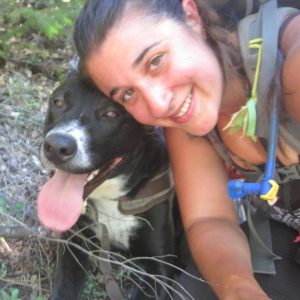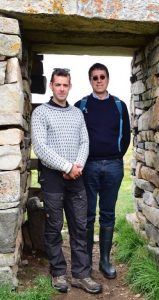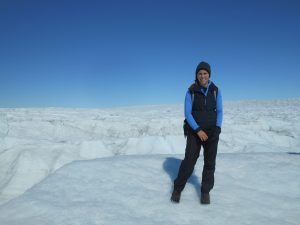The following is a list of the current members of my lab. You can also check out my Lab Hall of Fame to learn about previous lab members that have recently moved on to other endeavors.
Lauren Culler is a Research Assistant Professor of Environmental Studies and the Science Outreach Coordinator at Dartmouth’s Institute of Arctic Studies. She studies the impacts of rapid environmental change on insect population and community dynamics in northern ecosystems. Her current research tests how Arctic warming impacts insect-wildlife-human interactions. In addition to research, Lauren is Co-PI on a NSF grant for international science outreach in Greenland and Antarctica and she teaches in Dartmouth’s Environmental Studies Program. She has a Ph.D. in Ecology & Evolutionary Biology from Dartmouth, and a M.S. in Entomology and a B.S. in Zoology from the University of Maryland.
Melissa DeSiervo is a population and community ecologist interested in species interactions in a rapidly changing world. Her dissertation research is centered around the population biology of Arctic mosquitoes. Specifically, Melissa studies the competing forces that regulate mosquito populations at aquatic vs. terrestrial life stages including abiotic vs. biotic and density-dependent vs. density-independent interactions. Melissa conducts fieldwork in western Greenland where there is a sole species of mosquito (Aedes nigripes). From 2016-2018, she was a graduate fellow for the Joint Science Education Project (JSEP) — a program that engages high school students from three countries (the USA, Denmark and Greenland) in an immersive summer field school in Greenland. You can check out more about Melissa at her website: https://melissadesiervo.weebly.com/
Hunter Snyder is a PhD Student in the Program in Ecology, Evolution, Ecosystems and Society. He is committed to advancing the study and capability of livelihoods that depend upon living marine resources. His ethnographic research has focused on fisheries, subsistence livelihoods, and social-ecological disruptions in the Arctic. From 2014-2015, he was Greenland’s first Fulbright Fellow where he carried out fieldwork among small-scale fishers and hunters. In 2015, while a National Geographic Young Explorer, he studied shifts in the subsistence economy of Qeqertarsuatsiaat, Greenland as well as sharing and competitive behavior in the small-scale fishing sector. He took his master’s degree in anthropology at the University of Oxford and earned a graduate scholarship to read a second masters in fisheries resource management at the Marine Institute in St. John’s, Newfoundland. Before beginning his PhD, he was a consultant at the Food and Agriculture Organization of the United Nations, Fisheries and Aquaculture Department.
Alex Stendahl is member of the Class of 2019 at Dartmouth College, pursuing a double major in Environmental Studies and Anthropology modified with Asian and Middle Eastern Studies. She is passionate about the issues of climate change, specifically in the arctic. As a high school junior, she participated in the Joint Science Expedition Project where she travelled to Greenland and worked with students from the US, Denmark and Greenland about issues of climate change. This experience peaked her interest on issues relating to the arctic and she hopes to return to Greenland sometime soon. On campus, Alex is a fullback for the women’s varsity rugby team, and loves to make pottery in the ceramics studio.
Hanna Bliska is a member of the Class of 2020 at Dartmouth  College, where she hopes to pursue a major in Environmental Studies and a minor in Public Policy. She is interested in climate change and biodiversity loss, and hopes that combining her realms of environmental studies and public policy can prepare her to help address these issues. Hanna is currently working in the Virginia Lab as a Presidential Scholar. In her spare time on campus, Hanna plays the tenor saxophone in the Dartmouth College Wind Ensemble.
College, where she hopes to pursue a major in Environmental Studies and a minor in Public Policy. She is interested in climate change and biodiversity loss, and hopes that combining her realms of environmental studies and public policy can prepare her to help address these issues. Hanna is currently working in the Virginia Lab as a Presidential Scholar. In her spare time on campus, Hanna plays the tenor saxophone in the Dartmouth College Wind Ensemble.
 Reyn Hutten is a ’21 at Dartmouth College and is from a small island in Southeast Alaska. As an ecology and earth sciences major, she is interested in exploring and understanding the dynamic nature of the worlds ecosystems, and has encountered a fascination with the Arctic through her home in Alaska and Dartmouth. She spent summer of 2018 traveling and studying in Greenland with the Virginia Lab, both as a representative for Dartmouth undergraduates on a Dartmouth Alumni Expedition, and separately as a research field assistant and to provide support for the Joint Science Education Project. This year, Reyn is excited to be pursuing a Sophomore Scholarship with the Virginia Lab.
Reyn Hutten is a ’21 at Dartmouth College and is from a small island in Southeast Alaska. As an ecology and earth sciences major, she is interested in exploring and understanding the dynamic nature of the worlds ecosystems, and has encountered a fascination with the Arctic through her home in Alaska and Dartmouth. She spent summer of 2018 traveling and studying in Greenland with the Virginia Lab, both as a representative for Dartmouth undergraduates on a Dartmouth Alumni Expedition, and separately as a research field assistant and to provide support for the Joint Science Education Project. This year, Reyn is excited to be pursuing a Sophomore Scholarship with the Virginia Lab.
Sasha Gilmore was born and raised in Los Angeles, CA and is a member of the Class of 2021 at Dartmouth College. She is a double major in Environmental Studies and Geography. She is super excited to be working in the Virginia lab this year as a Sophomore Scholars, researching phosphorous cycling in the arid ecosystems of west Greenland. She enjoys the outdoors and meeting new people on campus!
 Katya Golubovsky is a member of the class of 2022 at Dartmouth College, and is from New York City. She hopes to study Biology and Spanish, and is passionate about Arctic environmental change and understanding the relationships communities have with their changing environments. In high school, she participated in research at the American Museum of Natural History, studying New York City coyote diet. Katya is extremely excited to be focusing on Arctic ecology as a Women in Science Project intern in the Virginia Lab.
Katya Golubovsky is a member of the class of 2022 at Dartmouth College, and is from New York City. She hopes to study Biology and Spanish, and is passionate about Arctic environmental change and understanding the relationships communities have with their changing environments. In high school, she participated in research at the American Museum of Natural History, studying New York City coyote diet. Katya is extremely excited to be focusing on Arctic ecology as a Women in Science Project intern in the Virginia Lab.
Erin McCarthy-Keeler is a member of the Class of 2019 at Dartmouth College, where she is pursuing a major in Environmental Studies, and a minor in Government. She is interested in climate change and conservation, and hopes to pursue a career in environmental policy or sustainable development. On campus, Erin is co-captain of the varsity equestrian team, and is a Rockefeller Leadership Fellow, as well as a Global Health Fellow with the Dickey Center for International Understanding.
Ava Hill is from Brooklyn, NYC, and is a member of the Dartmouth Class of 2022. She is thinking about majoring in some combination of Environmental Studies, Earth Science, and Geography. She is fascinated by the science and cultures of Polar regions and is thrilled to be working in the Virginia lab. Outside of class, she enjoys hiking, has a WDCR radio show, and helps organize concerts on campus through Friday Night Rock.
 Jeffrey Kerby is a Dickey Center Visiting Arctic Fellow and Neukom ’16 Post-doctoral Fellow at Dartmouth College. He is interested in how life history traits mediate speciesinteractions, particularly in highly seasonal and rapidly changing environments of the Arctic and alpine regions of Africa. This research touches on elements of community, landscape, and behavioral ecology, and has recently focused on gelada monkeys and large Arctic herbivores. In conjunction with this research, Jeff develops and tests applications for near-surface remote sensing platforms and the data they can generate. Themes include long-term quantitative time lapse photography, non-invasive morphometric scanning, and the deployment of small unmanned aerial systems (sUAS) designed for mapping and animal censuses in remote areas.
Jeffrey Kerby is a Dickey Center Visiting Arctic Fellow and Neukom ’16 Post-doctoral Fellow at Dartmouth College. He is interested in how life history traits mediate speciesinteractions, particularly in highly seasonal and rapidly changing environments of the Arctic and alpine regions of Africa. This research touches on elements of community, landscape, and behavioral ecology, and has recently focused on gelada monkeys and large Arctic herbivores. In conjunction with this research, Jeff develops and tests applications for near-surface remote sensing platforms and the data they can generate. Themes include long-term quantitative time lapse photography, non-invasive morphometric scanning, and the deployment of small unmanned aerial systems (sUAS) designed for mapping and animal censuses in remote areas.
 Angie Spickard manages the day-to-day activities in the Virginia Lab. Angie earned her M.S. in biology in 2000 from Western Michigan University, where she focused on the effects of elevated carbon dioxide on plant-insect interactions. She also holds a B.S. in biology from James Madison University. After completing her graduate studies, Angie worked on environmental policy at the U.S. EPA Office of Transportation and Air Quality. During her time at EPA, she helped to implement a Clean Air Act program that ensures that cities and states are meeting their transportation clean air goals. With a background in lab work, field-based ecological research and environmental policy, Angie provides support to a variety of aspects of the research conducted in the Virginia Lab.
Angie Spickard manages the day-to-day activities in the Virginia Lab. Angie earned her M.S. in biology in 2000 from Western Michigan University, where she focused on the effects of elevated carbon dioxide on plant-insect interactions. She also holds a B.S. in biology from James Madison University. After completing her graduate studies, Angie worked on environmental policy at the U.S. EPA Office of Transportation and Air Quality. During her time at EPA, she helped to implement a Clean Air Act program that ensures that cities and states are meeting their transportation clean air goals. With a background in lab work, field-based ecological research and environmental policy, Angie provides support to a variety of aspects of the research conducted in the Virginia Lab.






